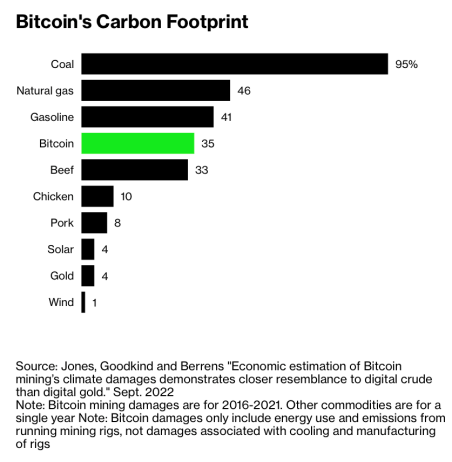Bitcoin’s carbon footprint is bigger than beef, new study shows

Cryptocurrency mining requires highly specialized computers and is very energy intensive, with most of the electricity consumed generated by burning fossil fuels.
According to new researchers from the University of New Mexico in Albuquerque, mining Bitcoin, the world’s largest cryptocurrency, has nearly the same climate impact as cattle ranching or burning gasoline when calculated as a percentage of market capitalization.
What exactly is cryptocurrency and how is it mined?
Cryptocurrency is a type of digital money that is protected by encryption in a publicly visible and seemingly immutable way. People can conduct direct financial transactions with these currencies without the use of a bank or other financial intermediaries.
They operate on systems known as blockchains, which are collections of records of digitally signed transactions that show every time a cryptocurrency is moved or used.
Due to the synchronized copies held on computers around the world, which also make it incredibly impossible to change, add or remove blockchain entries, blockchains are sometimes referred to as distributed ledgers.
As an example, Bitcoin operates on a distributed ledger or decentralized computer network that keeps track of bitcoin transactions. New bitcoins are produced or mined when computers on the network verify and execute transactions.
The transaction is processed by these networked computers, or miners, for a Bitcoin payment.
How bad is cryptocurrency for the environment?
The new research from the University of New Mexico, published in Scientific Reports at the end of last month, found that Bitcoin mining resulted in economic losses linked to climate change on 6.4% of the days it was traded between 2016 and 2021.
The study compared the climatic costs of mining Bitcoin with other commodities such as crude oil, gold and meat. This means that the results do not reflect the total emissions of these businesses, which would have been much higher, but rather their relative effect.
Gold mining, to which Bitcoin is sometimes compared, has a climate effect of just 4% of average market price each year, compared to 35% for the world’s most popular cryptocurrency between 2016 and 2021.
By 2020, the energy needed to mine Bitcoin, which accounts for around 41% of the global cryptocurrency market, would be sufficient to power Austria or Portugal.
According to other studies cited in the research, between January 2016 and June 2018, carbon dioxide emissions from mining Bitcoin, Ether, Litecoin and Monero currencies ranged from 3 to 15 million metric tons. It can be compared with the emissions from Afghanistan, Slovenia or Uruguay in 2018.
Related articles: Are cryptocurrencies a sustainable payment solution? | The “Crypto” Carbon Crisis: Can CryptoArt and NFTs be Sustainable?
Because more miners compete to validate transactions on the blockchain to mine new coins, Bitcoin’s carbon footprint increases over time. The total amount of energy used rises as more miners strive to complete increasingly challenging activities.
One Bitcoin produced in 2021 would have generated 113 metric tons of CO2 equivalents, which is 126 times more than one mined in 2016. According to researchers from the University of New Mexico, the economic cost of this damage for a single Bitcoin mined last year was $11,314. while the cost of all the climate damage caused by all the Bitcoins mined between 2016 and 2021 may have reached $12 billion.
Falling profit margins from Bitcoin mining have encouraged miners to run more efficient equipment in recent months, resulting in a drop in greenhouse gas emissions from the industry, according to a separate analysis earlier this week. Emissions are expected to be 14.1% lower this year than in 2021, accounting for around 0.1% of global human emissions and about half of what gold miners emit in absolute terms.
To the dismay of gamers, demand for computer graphics cards skyrocketed before the collapse in cryptocurrency values earlier this year, driving up prices and evaporating store shelves. These GPUs proved to be perfect for cryptocurrency mining setups, which can result in unexpected external influences.

Will Eliminating Ethereum ‘Mining’ Help the Environment?
A significant software change to the cryptocurrency Ethereum has the potential to significantly reduce energy use and the associated climate impacts.
The software upgrade makes mining largely unnecessary. While Ethereum once pitted rival miners against each other to solve difficult cryptographic problems and earn new coins as rewards, it now asks parties who want to help with transaction validation to put some skin in the game by “staking” a certain amount of Ether , Ethereum token.
Randomly selected parties from this pool validate a block of transactions; their work is then verified by a larger set of ether holders. Successful validators receive an Ether payout that is often inversely correlated to the amount of their stake and how long they have held it.
While the Ethereum merger may not seem like much, it could have significant ramifications.
Calculations made by economist and creator of Digital economist consultant, Alex de Vries, shows that Ethereum will save between 99% and 99.99% of current energy use as a result of the change (De Vries emphasizes that no peer has yet reviewed his work).
De Vries also calculated the annual carbon dioxide emissions caused by Ethereum: 44 million metric tons. If he is right, these will now be significantly reduced.
Compared to Ethereum, however, Bitcoin uses significantly more energy and emits more greenhouse gases, and there doesn’t seem to be much interest in abandoning bitcoin mining.
According to Lena Klaassen, co-founder of Crypto Carbon Ratings Institute, a German organization that specializes in evaluating crypto environmental impacts, Ethereum’s merger was long anticipated and included years of planning by the development teams. As she explains:
“Such ambitions have never existed for Bitcoin, which is why I don’t expect Bitcoin to pass [away from mining] anytime soon.”
Editor’s note: The opinions expressed here by the authors are their own, not those of Impakter.com — In the highlighted image: Bitcoin. Featured image credit: Jievani Weerasinghe.

























